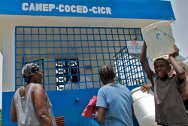Haiti: humanitarian situation still worrying, one year after the earthquake
11-01-2011 Interview
A year after the earthquake that struck Haiti on 12 January 2010, tens of thousands of buildings still lie in ruins, and Haiti is in the grip of cholera and electoral uncertainty. ICRC Haiti delegation head Riccardo Conti talks about what has been happening and explains what aid workers are doing to meet the ever-increasing needs.

Riccardo, you were in Haiti when the earthquake struck. How do you feel, one year later?
What impresses me most is the incredible resilience of the Haitian people. It's amazing to see how people who have lost everything – home, family, job – can maintain their hope and their courage, and indeed show a truly exemplary degree of solidarity.
Haitians learned how to look after themselves many years ago. They solve their problems on their own, without waiting for help from outside. To take one example, the street traders were back at work just a few days after the earthquake. These are the people that thousands of Haitians rely on, and the resumption of trade restored confidence.
In humanitarian terms, how has the situation developed since the earthquake?
The humanitarian situation is still worrying. The population, the authorities and the structures of the State have all been weakened by a series of problems: the earthquake, storms, a cholera epidemic and post-electoral violence. There are many humanitarian organizations on the ground, but they can never fully replace the services of the State, at least not in the medium and long term.
Many people are still living under difficult conditions, and the cholera epidemic is not yet under control. The reconstruction phase will inevitably take a long time, because it consists of several stages. The first priority is to build temporary shelter, before starting work on permanent buildings.
The presidential and parliamentary elections currently under way also give cause for grave concern. A month ago, violent demonstrations brought certain towns to a standstill, making it even more difficult for people to obtain water and get medical treatment. The political situation in Haiti remains uncertain. Many important projects, especially in the field of infrastructure, are on hold pending the arrival of a new government.
How would you assess the humanitarian action undertaken in Haiti since 12 January 2010?
I would say that the results have been mixed. The situation is difficult, and it is not one that the humanitarian organizations can manage on their own. They have been doing the best they can under the circumstances, but hundreds of thousands of people are still living in tents and in overcrowded conditions. The medical facilities set up after the earthquake, together with a regular supply of drinking water prevented a major health crisis for several months. This was a major challenge. The International Red Cross and Red Crescent Movement was very active in this area, and the cholera epidemic would have claimed far more lives had it not been for other humanitarian organizations, such as Médecins Sans Frontières, Médecins du Monde, Samaritan's Purse and many others.
The past year has been an extremely intense one for the ICRC. Having been in Haiti since 1994, we were quickly able to mobilize and start contributing to the relief effort. Between January and March 2010, we distributed essential supplies (blankets, plastic sheeting, buckets, kitchen sets, etc.), food and water to over 50,000 people. Working with the Haitian Red Cross, our teams enabled thousands of families to re-establish contact and reunited children with their parents.
In cooperation with the other components of the Movement, the ICRC has resumed the work it was doing before the earthquake, improving living conditions in prisons and making it easier for people in disadvantaged areas of Port-au-Prince to obtain water and health care. Those programmes have been stepped up considerably since the cholera epidemic started.
We have set up cholera treatment centres in several prisons, and increased the number of staff. I am convinced that these measures have saved many lives and prevented many people from contracting the disease.
What are the ICRC's priorities in Haiti for 2011?
Today, the most critical needs in Haiti often stem from the absence of public services for those most at risk. I'm thinking here in the first instance of people displaced by the earthquake, but also of prisoners and people in poorer areas, who get less of a mention in the media. The fact that basic services are inadequate has definitely made the cholera epidemic worse, and these problems are likely to increase during 2011.
The ICRC will continue its efforts to improve the humanitarian situation, working closely with the International Red Cross and Red Crescent Movement and other agencies, both Haitian and international. Prisons will be our top priority, both because prison living conditions remain difficult and because we are among the few humanitarian agencies working in prisons.
Repairing the water network in Cité-Soleil, a working-class district of Port-au-Prince, will remain a major project in 2011. Over 200,000 people will benefit when work is complete. Both here and in Martissant, another area of the capital, the ICRC will continue to support the work of Haitian Red Cross first-aiders who get people to hospital and promote health and hygiene.
Finally, the ICRC will continue its efforts to reunite with their families children separated by the earthquake, as a number of cases have still not been resolved.
Since the earthquake, the ICRC has:
- distributed emergency aid to over 50,000 people;
- supported 15 health facilities and 10 first-aid posts for three months, supplying them with medicines and equipment;
- made satellite phones and Internet access available, enabling thousands of people to contact their families in the days immediately following the earthquake;
- enabled 80 children to rejoin their families, or at least make contact;
- repaired prison infrastructure damaged by the earthquake;
- supported the prison authorities by supplying food and medicines for over 4,500 prisoners during the emergency phase.



